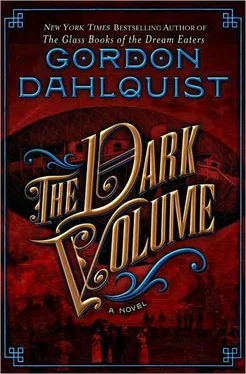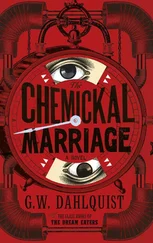Gordon Dahlquist - The Dark Volume
Здесь есть возможность читать онлайн «Gordon Dahlquist - The Dark Volume» весь текст электронной книги совершенно бесплатно (целиком полную версию без сокращений). В некоторых случаях можно слушать аудио, скачать через торрент в формате fb2 и присутствует краткое содержание. Город: New York, Год выпуска: 2009, ISBN: 2009, Издательство: Bantam Books, Жанр: Прочие приключения, на английском языке. Описание произведения, (предисловие) а так же отзывы посетителей доступны на портале библиотеки ЛибКат.
- Название:The Dark Volume
- Автор:
- Издательство:Bantam Books
- Жанр:
- Год:2009
- Город:New York
- ISBN:978-0-553-90603-5
- Рейтинг книги:3 / 5. Голосов: 1
-
Избранное:Добавить в избранное
- Отзывы:
-
Ваша оценка:
- 60
- 1
- 2
- 3
- 4
- 5
The Dark Volume: краткое содержание, описание и аннотация
Предлагаем к чтению аннотацию, описание, краткое содержание или предисловие (зависит от того, что написал сам автор книги «The Dark Volume»). Если вы не нашли необходимую информацию о книге — напишите в комментариях, мы постараемся отыскать её.
The Dark Volume — читать онлайн бесплатно полную книгу (весь текст) целиком
Ниже представлен текст книги, разбитый по страницам. Система сохранения места последней прочитанной страницы, позволяет с удобством читать онлайн бесплатно книгу «The Dark Volume», без необходимости каждый раз заново искать на чём Вы остановились. Поставьте закладку, и сможете в любой момент перейти на страницу, на которой закончили чтение.
Интервал:
Закладка:
“Why would Vandaariff destroy his own house?”
“Why scruple at the house when he has already sacrificed his daughter? The stakes must be beyond imagination! What were you instructed to retrieve? Where are you to take it?”
“I do not know. It was a… a thing . I was told no more.”
“But you were given details, a description…”
“I was told it was bright metal, and perhaps the size of…”
She held out her hands and extended her fingers to indicate triggers and knobs. She thought of the wicked snouty implement the Comte had employed to violate Lydia Vandaariff and began to describe it. As she spoke Fochtmann set down the quill and began to search through the piled documents.
“And it would fit in your case?” he asked.
“Apparently the item folds.”
“Ah… as I assumed…”
Fochtmann pushed one wide page of foolscap across the table to her. She turned it right side up and saw a cross-section diagram of the exact object, labeled in the Comte's hand an “ethereal irrigator.” Miss Temple inhaled sharply through both nostrils and met Fochtmann's gaze—anything to look away from the diagram. At the sight of it her flesh crawled, imagining its usage—the prone form of Lydia Vandaariff, limbs secured, legs forced apart, the thickened blue mixture to be extruded from the metal snout at the exactly right temperature. She bit back her disgust—at Lydia's weakness, at the uselessness of women, at the arrogance of human effort, at Fochtmann's idiotic pride. Miss Temple set the page down.
“Aren't you curious where it is?” he asked.
“Not anymore.”
“Do not be downhearted. I have seen others far worse off than you.”
“Where is the Duke of Stäelmaere?”
“Indeed,” said Fochtmann, as if her question illustrated his point. “Having done a minimal examination, I have to admit, the dynamic properties of this indigo clay are singular. To turn a little thing like death on its damned head…”
Miss Temple ignored him, suppressing the burn in her throat.
“And where is Colonel Aspiche?” she croaked.
Fochtmann frowned at the interruption.
“Where is Robert Vandaariff?” he demanded.
“Where is Mrs. Marchmoor?”
“Where did he take all the machinery?”
“Where is Mrs. Marchmoor?”
“No, you must answer me! Where is Robert Vandaariff? Why does he want this particular tool? Why did he send you?” He slammed both fists onto the table, his long arms like the forelegs of a powerful horse. “You cannot brave me unless you are prepared to brave Mrs. Marchmoor! However… if you cooperate with me now …”
Miss Temple shivered to recall the glass woman hammering her mind.
“You have no choice,” he said, gently as a farmer easing a lamb onto the block.
“It's because you can see, isn't it?” she said. “You understand what this glass can do, perhaps now more than any man alive… they have employed you like a coachman, but they do not comprehend that you will gain an advantage over them all… over her, over the world.”
Fochtmann smiled tightly, immensely pleased with her description.
“What will you do with me?” Miss Temple asked.
“That depends. You must do what I say.”
“Must I?”
He chuckled. Miss Temple leaned across the table, as if to share a final secret, daring him to hear it. Despite himself, Fochtmann leaned down to meet her. Her voice was a whisper.
“You were given a chance.”
She swung the case with all her strength, for it was well made, with sharp metal corners—one of which caught Mr. Fochtmann's shining forehead like the spike of a chisel. He reeled with a cry, one hand to the wound, blood already pouring through his fingers and across the Comte's papers.
“O! O damn you to hell! Help! Help me— help!”
Instead of running to the door, which had been her first impulse, Miss Temple instead went directly at the weaving, keening man. He saw her coming and croaked his defiance, waving a spattered palm to ward her off, but she swung the case again, with both hands, hard, cracking it straight into his right kneecap. Fochtmann toppled with a squawk at her feet. Miss Temple felt the sickening black presence in the back of her throat. She brought the case down once more on Mr. Fochtmann's head and stopped his movements altogether.
HE WAS still alive, for the bellows of his chest beat like the wet wings of a newborn insect. Miss Temple seriously considered cutting his throat with the knife in her boot—inflamed without even noticing by seven different memories of that very action, nose thick with the remembered smell, hands twitching at how hot the spray—but instead she sensibly crossed to the door and locked it. She returned to the prone man—curious at how out of their element a tall person seems when on the ground, like fish on a tar-baked dock. Ignoring the dark coagulated smears above his face, she stepped to his topcoat, hung on a chair: cigars, matches, a scented handkerchief, a brass case of visiting cards printed with swirling script on a pale green bond paper (Marcus Fochtmann, Theoretical Engineer, 19 Swedter Street) .
The outer pocket contained something heavy and clinking, and Miss Temple extracted a canvas pouch, sewn shut, like a bag of grape-shot for a tiny cannon. She sensed a glimmer of nauseating memory and forced it away—any more and she would vomit. What did every detail matter—no doubt the bag held machine parts—and she shoved it angrily back into his coat.
The final pocket was custom-made, for it was long and perfectly suited for what it in fact held, a rolled piece of stiff vellum. Miss Temple hesitated, but could not prevent herself from unrolling the paper. The sheet held an elegant sketch by the Comte d'Orkancz of a slotted brass pedestal, trailing thick metal tubes and black hoses. At the sight of the sketch a black acrid surge brought Miss Temple to her knees, gagging, but the harsh strain on her throat was subsumed by a wave of perception as to the pedestal's function . The slot held a glass book. The tubes and hoses were attached to a person, laid out upon a table—the machine serving to connect the glass book to that person's mind. Depending on how one set the seven brass knobs, alchemic energy could flow in either direction. If the energy was directed toward the book , the person's mind was drained and the book inscribed with their memories. If the energy was directed toward the person , the book's contents were imprinted on the person's mind, obliterating their own memory—and possibly, if one chose to use the word, their soul.
Miss Temple gasped as if she had been submerged in water and with desperate fury ripped the vellum drawing in half and then half again, pulling the pieces to ragged bits. Her mind swam with black loathing, and when her eyes found Fochtmann laid out next to her, his eyelids fluttering, she was at once caught between the futility of any action and the sharp urge to end his life. The knife lay in her boot. Fochtmann's right hand feebly groped the carpet. He was an enemy. If one saw the world with open eyes, was it anything but cowardice to halt half-way? Chang would not have scrupled to kill him. The Contessa would have slain the man without a qualm. Miss Temple wanted to believe her rage was her own, but as she swayed on her feet she knew it had been contaminated every bit as much as her desire.
With a tremor of fear she tried to remember some moment of her own —some instant she could claim—but found only a new swirl of visions, like the flutters of a dovecote, set loose inside her head. She squeezed her thighs together and sucked hard on her lower lip, appalled at the sudden rush of sweetness in her loins, and groaned (… smooth cool marble against her bare buttocks, her fingers, heavy with ecclesiastical signets, forced into a grunting man's mouth…), willing her thoughts to something else—to someone else—but it seemed as if every bit of care and affection in her heart had been translated to mere hunger, the impulse of animals, a callous cycle of need and dissipation, of emptiness and death at the end of everything, woven into each moment, inevitable and cruel. She remembered Chang's hand on her body and gagged, steeped in the horrid futility of each morsel of longing.
Читать дальшеИнтервал:
Закладка:
Похожие книги на «The Dark Volume»
Представляем Вашему вниманию похожие книги на «The Dark Volume» списком для выбора. Мы отобрали схожую по названию и смыслу литературу в надежде предоставить читателям больше вариантов отыскать новые, интересные, ещё непрочитанные произведения.
Обсуждение, отзывы о книге «The Dark Volume» и просто собственные мнения читателей. Оставьте ваши комментарии, напишите, что Вы думаете о произведении, его смысле или главных героях. Укажите что конкретно понравилось, а что нет, и почему Вы так считаете.












